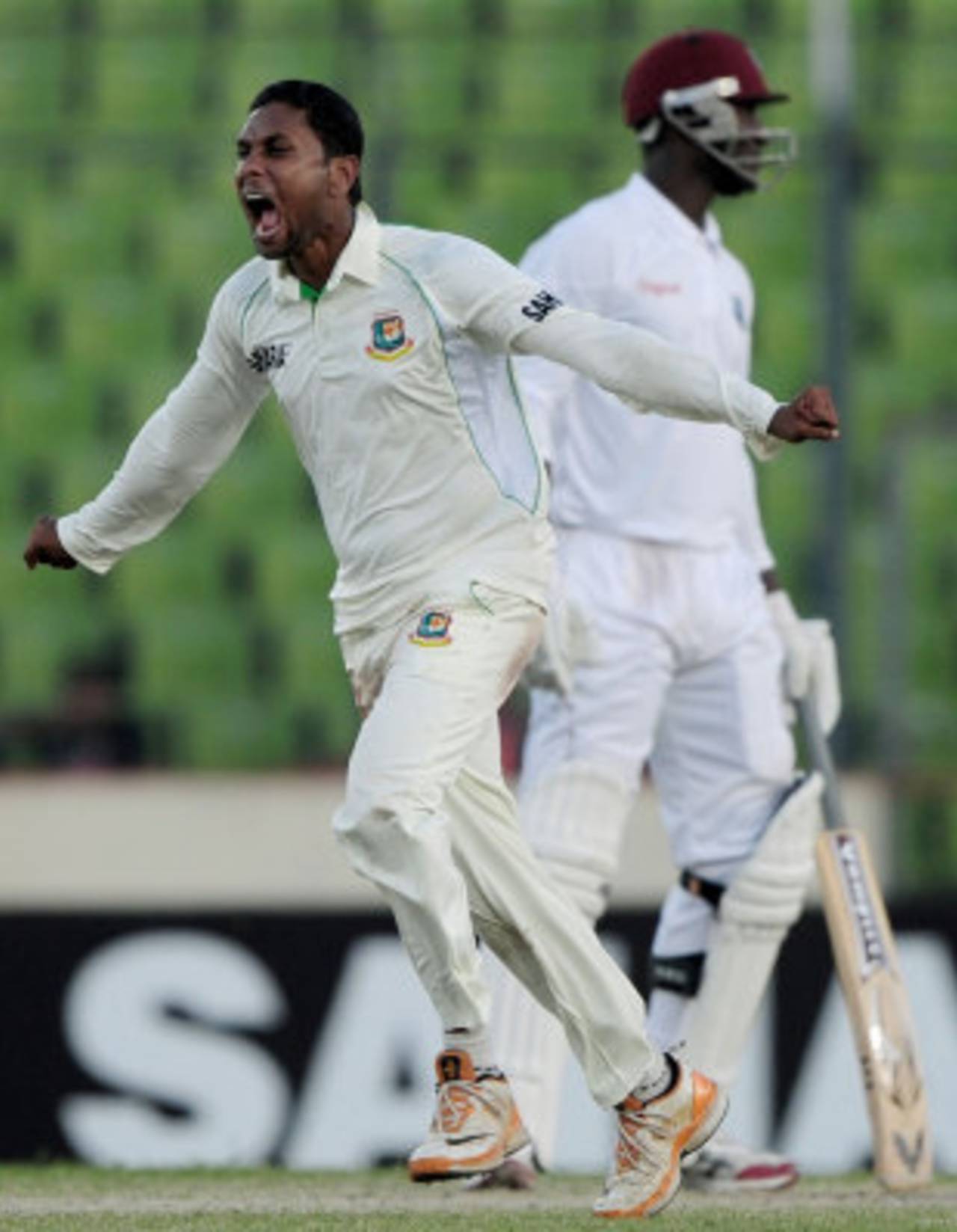Sohag Gazi overcomes small-town doubts
Sohag Gazi's journey to Test level hasn't been easy, but the Bangladesh offspinner could be an inspiration for youngsters from small towns to pursue their dreams
Mohammad Isam
Nov 19, 2012, 4:54 PM

Sohag Gazi's Test debut began with him getting hit for six; he ended it with a nine-wicket haul • AFP
Khulna is where offspinner Sohag Gazi was born. It's where he learnt his cricket. The Sheikh Abu Naser Stadium, the venue for the second Test against West Indies, is where Gazi began his first-class career with a five-wicket haul. Three years on, he has made an impressive Test debut, but the journey hasn't been easy from the time he began representing his hometown Patuakhali, a tiny coastal town in Barisal Division. As cricketers from small towns often do, Gazi faced rejections, but he is now developing a "weapon" - a delivery that doesn't spin bowled with an unchanged action - which he believes will give him an edge in international cricket.
"I started as a pace bowler but I wasn't that quick, so I took to offspin in my teens. My coach at the time said that my height will help me," Gazi told ESPNcricinfo. "I got a lot out of bowling offspin when I was younger, but I wanted to develop a weapon of my own so that everyone knows I am the one who created this delivery. Spinners [shouldn't] just spin the ball, they need to have something extra. I sometimes try the doosra but I have a lot of faith in my weapon."
The nine wickets he took in the Mirpur Test against West Indies and the six-wicket haul in the second innings were both records for Bangladesh bowlers on debut. He used the weapon he spoke of often in the second innings and that delivery accounted for Marlon Samuels, Darren Sammy and Shivnarine Chanderpaul among others.
"My dream was to play for Bangladesh. When I started understanding the game, and started competing in age-group cricket, from then I wanted to play for Bangladesh," Gazi said. "I never told anyone, but it was within me."
A son of a government officer, Gazi began playing age-group cricket in 2000, but though he climbed the rungs he was only a standby for the 2006 Under-19 World Cup. Orient Sporting Club, a Dhaka First Division League side, signed him and he remained there for the next four years. Gazi's patience in Dhaka's second-grade cricket earned him a place in the Barisal team during the 2009-10 National Cricket League. After he became the highest wicket-taker in the next season, Gazi was nominated among the National Cricket Academy (NCA) graduates. He was adjudged the best player in NCA's South Africa tour last year and as soon as he made it to the Bangladesh A side, his senior call-up was imminent.
There were moments during his development, however, when Gazi felt like giving up the game. For a cricketer who comes from a region not known for sporting prowess, his opportunities dried up after the Under-19 World Cup snub. "I was a standby in age-group cricket for five years. I felt bad, which is natural for any cricketer who gets dropped or ignored.
"Sometimes I wanted to leave the game but my parents and my elder brother told me to hang on, wait for the next opportunity. I was determined to see it through. I wanted to see what was there in the end for me."
On Test debut, Gazi was given the responsibility of bowling with the new ball, and faced an intimidating opponent in Chris Gayle. His first and fourth balls disappeared for sixes. His captain Mushfiqur Rahim did not lose faith in the debutant.
"We had planned earlier to open with him [Gazi]. Gayle always attacks so we couldn't be defensive against him to get him out. We wanted to attack him," Mushfiqur said. "He didn't play his natural shots in the first over. The shot he got out to wasn't his natural shot. He doesn't come out of his crease so early in the innings. In the second over, he played a rare sweep shot. Gayle wanted to get rid of Gazi quickly, but we trusted him. We wanted to give away 20-30 runs but get Gayle out."
Gazi knows he will have to face more disappointments, an inevitability of life on the toughest stage. His story, however, is an example to all small-town cricketers in Bangladesh that reaching the top is possible.
Mohammad Isam is ESPNcricinfo's correspondent in Bangladesh